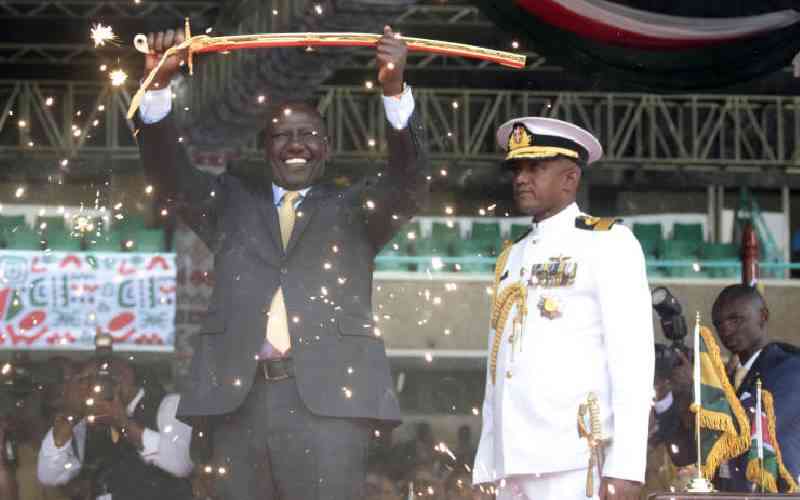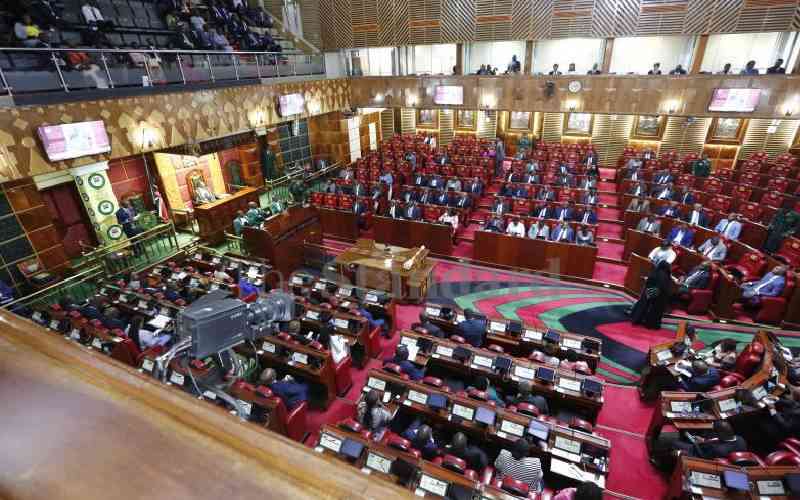“We, the people of Kenya....adopt, enact and give this Constitution to ourselves and to our future generations.”
I begin by being appreciative of the tremendous gains made so far in the implementation of the Constitution (2010). There is a raging debate about whether Parliament should be dissolved or not for not passing the requisite pieces of legislation as required in the Constitution under Schedule 5.
And whereas I certainly believe we could have done better, I don’t think it is Parliament that should purely shoulder this blame.
In the Sixth Schedule of the 2010 Constitution, there is established a body known as the Constitution Implementation Commission (CIC) whose role is “co-ordinating with the Attorney General and the Kenya Law Reform Commission in preparing, for tabling in Parliament, the legislation required to implement the Constitution.”
Note, the Constitution says preparing for tabling in Parliament, (not elsewhere where the blame has been shifted). Now let me bring you up to speed with the litany of extension periods for passage of these critical pieces of legislation:
First, the National Assembly extended by six months the period for passage of Year Three Bills as stipulated in the Fifth Schedule. This extension came as a result of the bills giving effect to Article 34 of the Constitution, which had generated serious street activities by media practitioners. There was no way a new House would rush the two bills – the Media Bill 2013 and Kenya Information and Communications (Amendment) Bill 2013 - without input from industry players.
It was therefore necessary that the Committee responsible, the Ministry of Information and Communications and the media be given sufficient time to comb through the bills and agree on contentious issues before they were passed. This was done.
Second, the Year Four Bills. In January 2014, Parliament wrote to the CIC and the Attorney General asking for bills and status of drafting of all the legislation falling in the fourth year of implementation.
You will be surprised to know three days to the deadline - by August 25, 2014, some of those bills like the Public Audit Bill and Public Procurement and Asset Disposal Bill (2014) were yet to be brought before the National Assembly. The two bills required input from both Houses of Parliament.
It became our responsibility to extend this period for a further nine months. Suffice to say, these two bills were brought before the house in December, 2014.
This conscious decision to extend has taken cognisance of the fact that some bills like the Fair Administration Action Bill, a Fourth Year Bill, were yet to be proposed.
Third, let me tell you why we had to extend these deadlines for the third time this week. Seven months ago, the Leader of Majority Party (National Assembly), on request from the House Business Committee wrote to the CIC and AG asking for the progress in forwarding all Year Five bills so that the house could align its sittings and calendar early enough to pass these bills.
Suddenly, the CIC and AG woke up from a deep slumber and started shifting the blame – oh, today it’s the Cabinet, tomorrow ministries and the next day Government entities. Reason? That these are the Government entities that should originate the bills. All the way up to last month, none of these entities – CIC, AG, KLRC – authoritatively knew how many pieces of legislation needed to be passed in the year five timeline!
Whereas it is clear that 14 Articles of the Constitution required legislation to give the effect, the wording of the last section of Schedule Five is too general and subject to different interpretations, thus leading to confusion. For instance, the Consumer Protection Act, which was a year three bill, and the law for recall of MPs done in Year One, need amendment to make them adequate and effective, according to CIC.
Trouble is, there is contention as to whether it is CIC who should interpret whether an Act adequately satisfies the requirements of the Constitution. Parliament and myself believe that that is within the jurisdiction of the High Court under Article 165 of the Constitution. All in all, 12 bills were received last week ready for debate in the House, most of which require input from both houses of Parliament. That is why this time, we extended the period for enactment by another 12 months, hoping that those who have not been keen on their duty, take their mandate seriously so that we finish this business by August 27, 2016.
Stay informed. Subscribe to our newsletter
I would like to give my commitment as the Speaker of the National Assembly that the House will do all that it must within the stipulated time to ensure this business is dispensed of with. We shall however, not rush the process, so that we give enough time for public participation as anticipated in Article 118 of the Constitution.
It is indeed the right of any Kenyan to go to the High Court to petition the honourable judges for the dissolution of Parliament, but I do not see this coming.
Do not forget that such a process is long and tedious, and during such a period, the House may have dispensed with the relevant bills to avoid dissolution.
Take it from me; Parliament will do its bit faithfully.
 The Standard Group Plc is a
multi-media organization with investments in media platforms spanning newspaper
print operations, television, radio broadcasting, digital and online services. The
Standard Group is recognized as a leading multi-media house in Kenya with a key
influence in matters of national and international interest.
The Standard Group Plc is a
multi-media organization with investments in media platforms spanning newspaper
print operations, television, radio broadcasting, digital and online services. The
Standard Group is recognized as a leading multi-media house in Kenya with a key
influence in matters of national and international interest.
 The Standard Group Plc is a
multi-media organization with investments in media platforms spanning newspaper
print operations, television, radio broadcasting, digital and online services. The
Standard Group is recognized as a leading multi-media house in Kenya with a key
influence in matters of national and international interest.
The Standard Group Plc is a
multi-media organization with investments in media platforms spanning newspaper
print operations, television, radio broadcasting, digital and online services. The
Standard Group is recognized as a leading multi-media house in Kenya with a key
influence in matters of national and international interest.








